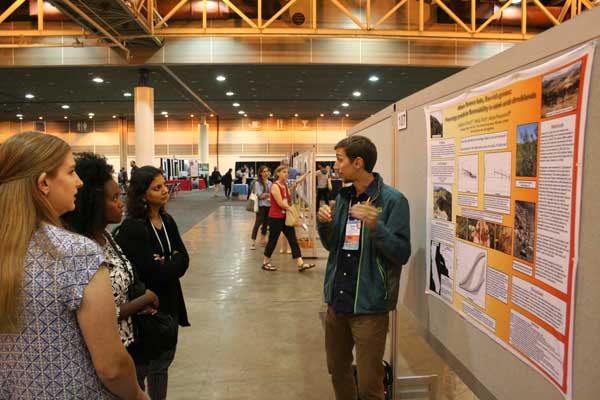
Attendees listen to a presenter at an ESA poster session.
Did you know the ESA annual meeting receives twice as many contributed abstracts for talks compared to posters? Over the past decade, only 1 out of every 3 contributed abstracts has been submitted for a poster. Despite some misconceptions, ESA does not cap the number of oral presentations or re-assign some abstracts that requested oral presentation slots to posters. The abstract guidelines for both formats are the same. So what’s driving the low number of posters? Presenter choice. Every accepted abstract is given the format the presenter requested at the time of submission.
The relatively low number of posters is a missed opportunity for presenters to engage with other attendees and discuss their work in more depth. In post meeting surveys, attendees frequently mention networking as a major strength of the conference, and multiple parallel oral sessions as a major weakness. We encourage ecologists at all career stages to consider submitting a poster abstract to help us create a more balance meeting program that will better serve attendee needs, and to further stimulate networking opportunities.
Oral presentations have a limited audience. Attendees have a choice of many simultaneous oral sessions, some years as many as 35. Posters are available for viewing for longer periods (a full conference day!), and presenters have the opportunity to personally interact with many more meeting attendees during the poster session. A poster session is 90 minutes long, whereas the short Q&A after oral presentations is at most a few minutes.
There are many more substantive opportunities to have face-to-face conversations about your findings during the poster session. For scientists at all levels, you will receive much more feedback and be able to answer many more questions about your research. There are no conflicting sessions during posters, so people who are interested in your work are more likely to be present. This can be helpful for students and early career scientists who are just starting to build a professional network as well as senior scientists with limited opportunities to catch up with their existing contacts.
There is enormous flexibility in the layout, content, and format of posters. The days of the prescribed formats for posters that mirror a scientific publication are gone. People are experimenting with newer and potentially more effective methods of visual communication, including the #betterposter format, or other creative options. As long as your poster fits on the board, it is your canvas to design however you see fit. How will your communicate your science? We encourage you to explore new, creative, and engaging ways to communicate your science via a poster.
Both talks and posters are time consuming to prepare. While you may (or may not) present your conference talk again, or reuse some slides, your poster can be permanently displayed after the meeting. You can prepare posters with a clear message and format that will continue to communicate ecological research long after the meeting is over. Does your lab, department, agency, office, or university have space for mounting well-prepared, visually interesting posters? Are there even more public venues like visitor’s centers, museums, or schools that have interest and space for science communication? There are arguably more options for reusing posters than talks, with more possibilities for reaching a wide audience.
It’s not uncommon for attendees who are presenting a talk to be touching up slides or even finishing their latest data analysis while they are on site. It can be a stressful time, splitting attention between finishing a big presentation, attending sessions, and networking with colleagues. We offer the poster sessions as a more relaxed and focused meeting experience. You arrive with your poster presentation already completed. In your session, there will be ample time for questions, feedback, and discussion. And of course, there is a cash bar with complimentary snacks! Perfect for conversation.
We hope we will see you this summer in Salt Lake City and that you will be presenting your work to share with colleagues.
Program Subcommittee
ESA Meetings Committee
Kiona Ogle
Ryan McEwan
Diane Pataki
Notifications